Hermann Beckh
Die Gruender der Christengemeinschaft: Ein Schicksalsnetz
By Rudolf F. Gaedeke
Translated by Cindy Hindes
Hermann Beckh
May 4, 1875, Nuremberg – March 1, 1937, Stuttgart
When Hermann Beckh received a visitor in the last days of February 1937 at his death bed in his parlor in Stuttgart’s Lichtensteinstraße No. 10, he said as a greeting: “…. please be quiet! Dying is happening here.” This saying is characteristic of his life, not only superficially because his utterances were often original, but because a main motif of his being was the search for life beyond death.
This does not seem to be self-evident. At first, his biography predominantly showed the fullness of the original forces of being human. Throughout his life, he was often like a child. Opposing forces fought at the bottom of his soul.
Born on May 4, 1875, into a well-to-do family in Nuremberg, Hermann Beckh grew up together with his younger sister ‘Mariele’ in a carefree childhood. The formative experiences of his first years were shaped by the flowers, the animals and stones, the weather, and the stars. His parents’ travels to the Tegernsee and Berchtesgaden regions and to the Allgäu enabled him to breathe deeply in his childhood soul. In the fourth year of life (1879), this led so far that a rapture state occurred. The impression of the high mountain world near Einödsbach (Allgäu) overwhelmed his consciousness: “I am sure that many people never experience anything of what I experienced there ‘on the other shore of being.’ It was the world of my prenatal existence, … which I had forgotten. ” This is how Hermann Beckh described this experience in his memories of childhood.
When he had to go to school, he felt that this was a ‘violation and deprivation of freedom.’ He didn’t understand why such methods were used when he was able to recite a page-long prose text by heart after reading it once. For years he studied as if in a dream. Languages especially were not difficult for him, so he eventually learned fourteen languages through his later studies. Only in the further school years did the painful necessity arise for him to work more systematically and with diligence. The ‘Gymnasiumabsolutorium,’ the Abitur, was then passed with flying colors. The written examinations had gone so well that oral ones were ordered. This qualified him for a place at the Maximilianeum in Munich.
If the Nuremberg Abitur fell in the year 1893, the study of law, for which Hermann Beckh strangely decided, lasted until 1896 and his time as an assistant judge until 1899. During this time (1899), it happened that he had to sentence a poor married couple with a child for wood theft. Because with a prison sentence, the child would have remained alone, Hermann Beckh sentenced the couple to a fine. But because the couple had no money, Hermann Beckh gave them the sum out of his own pocket after the sentence was passed – and resigned from his post.
Then he began to study anew. To access the sources of human culture, he learned Sanskrit, Tibetan, Indian, Persian, Egyptian, and Hebrew. He studied in Kiel and Berlin, where he received his doctorate from the Humboldt University in 1907 and qualified as a professor in 1908. He became the authority on ancient languages of the Himalayan region and was the first to translate many texts of that region from ancient manuscripts in the Prussian State Library. If he was thus close to the sources and origins of human culture, the second great area of death experience also emerged. He had loved the mountains since his childhood. Once, while hiking in the high mountains, he got caught in a dense fog. He spent a whole night on the edge of a glacier, his feet stuck in his backpack, fighting frostbite. When he was twenty-nine years old, his grandfather died (1904) – the first death in his immediate environment. During the First World War, he only had typing duties in Romania and Bulgaria, also in Kiel and Berlin. Death only really struck him closer when, fifteen years after his grandfather, in 1929, his beloved sister Marie, who had always faithfully accompanied him, died. The mother survived both children and died on May 25, 1943. (No date of the father’s death has been handed down.)
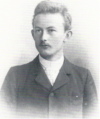
Hermann Beckh
In 1911, when Hermann Beckh was 36 years old, he met Friedrich Rittelmeyer as well as Rudolf Steiner. Since he had already become acquainted with Indian theosophy, he now found in anthroposophy the spiritual bond of all the cultural-historical studies he had pursued up to that time. Now the connection of the history of consciousness of humankind, as it also shows itself in the history of languages, became clear to him. With the two volumes of the Göschen Collection on Buddhism, published in 1916, he began his real life’s work (see the list of writings), which he developed as a speaker, university teacher, and writer.
In addition to his work on the early cultures of humankind, which gave rise to From the World of Mysteries, Hermann Beckh had been deeply involved in music since childhood. At the age of sixteen, he experienced Richard Wagner’s Parsifal in Bayreuth in 1891. The last of Beckh’s works, completed on his deathbed, was Die Sprache der Tonarten (The Essence of Tonality). He had also felt connected to the starry world from an early age. A rich work, “Beiträge zur geistigen Sternenkunde,” (Contributions to Spiritual Astronomy) was dedicated to his fellow pastors in their Rundbrief (newsletter).
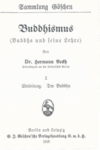
The fruit of Beckh’s studies on Buddhism
His two books about the cosmic rhythms in Mark’s Gospel and John’s Gospel should be mentioned especially. They would demonstrate from the spiritual science that the cosmos order and earthly working of Christ belong together.
In Karlsruhe, a philosophy professor, Arthur Drews, had written the book Die Christusmythe (The Christ Myth), in order to show that the Gospels contained nothing but mystical-fairy-tale illustrations of star processes (astral myths). This Arthur Drews belonged to the ‘Combat League against Anthroposophy’ and had expressed: “My I shall be taken by the devil after my death,” and his gravestone read: “Redemption is a detachment from the I.” Against the pantheistic religious philosophy of Arthur Drews, Beckh’s aforementioned works were meant as positive aids to understanding the Gospels.
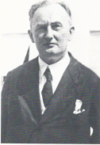
Hermann Beckh
The always childlike admirer of all that is high and noble, who nevertheless possessed intellectual abilities in abundance, the shrewd jurist, the profound explorer of the word, and the harmonies of the starry and tonal world reaped the fruits of his labor in abundance. Nevertheless, in his opinion, he lacked the real thing. When the preparations for the foundation of the Christian Community had already led to the first two teaching courses with Rudolf Steiner, Professor Beckh had not been asked to collaborate. He had been the anthroposophical speaker at the opening of the first Goetheanum building in 1920. Rudolf Steiner had said of him: “He has done a lot of research that I have not yet come to, although some of it is somewhat speculative.” Hermann Beckh was regarded as an outstanding expert who was not asked for new activity after he had given up his university work to serve Anthroposophy.
He heard about the preparatory group that met in March 1922 in Friedrich Rittelmeyer’s confirmation hall and appeared there with the vehement words: “Now I am here and belong to you; and even if you don’t like it, you won’t get rid of me! ” Thus he became a priest of his own will, a servant of the word in an even more comprehensive sense than before.
As a co-founder of the Christian Community in Stuttgart, he was also its teacher from the beginning. He had become acquainted with anthroposophy in 1911 through an Elijah lecture, but now he himself worked with the firepower of his will for the Word like Elijah. In December 1923, he attended the Christmas Conference for the founding of the General Anthroposophical Society at the Goetheanum in Dornach.
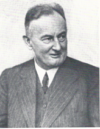
Hermann Beckh
He was also the lovable-scattered, shy, yet child-loving professor who, somehow not quite present, often seemed clumsy and tempted ridicule. He was lonely in the founding community. He remained misunderstood and knew that he had to “persevere in resistant circumstances.” His severe kidney cancer forced his soaring spirit through pain to the body: “dying is happening here.” But looking to the future, he had written in a poem about the New Jerusalem:
“And even if my path still leads over graves,
Even if I must still be a bearer of death,
There shines on the path from the world’s farthest reaches
the resting star’s holy serious light.”
As a seminary teacher, Hermann Beckh had imparted to a whole generation of priests the enthusiasm for the spiritual work with the word, the language. The Christian Community preserves his work in the cultural sphere, where his renderings of Genesis 1 – “In the Spiritual Thought of the Original Beginning” and of the 23rd Psalm – “He who speaks the I in me is my shepherd…” – are read again and again on the occasion of larger sermons.
Caption for Picture:
The fruits of Beckh’s studies on Buddhism

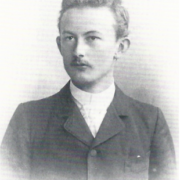

Leave a Reply
Want to join the discussion?Feel free to contribute!